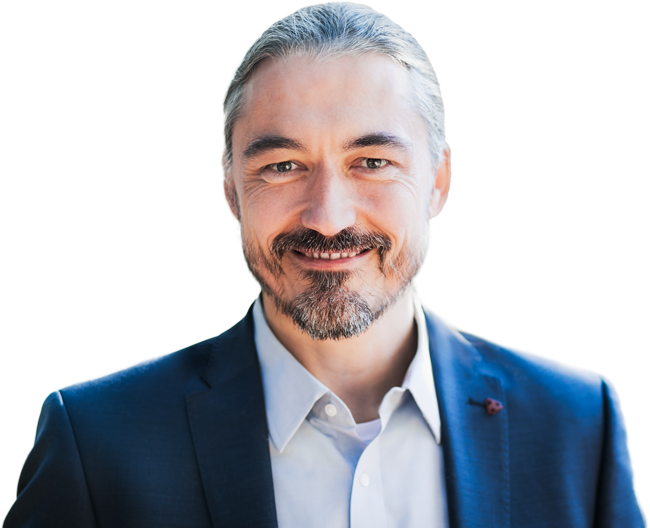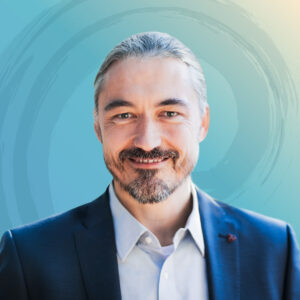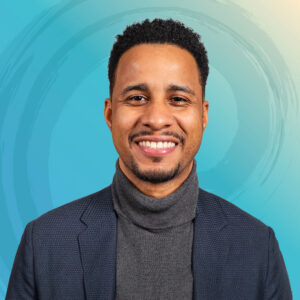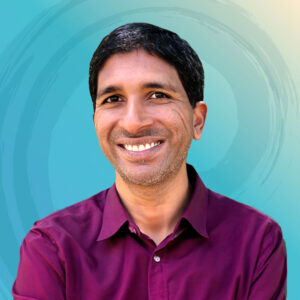Thomas explores the concept of Ancestral Healing – a way of attuning with our ancestors and integrating the information they’ve passed down through our family histories. We inherit wisdom and resilience from our ancestors, as well as trauma and pain. Thomas explains the need to incorporate all of these aspects into ourselves so that we can draw strength from our ancestral data flow when we need it, and learn from their wounds and transgressions in order to release ourselves and our families from patterns that no longer serve us.

EPISODE 13
April 25, 2023
Ancestral Healing: The Gifts and Wounds of Our Ancestors

Share this:
Listen Now
“My body is a form that is based on millions of years of information.”
- Thomas Hübl
Guest Information

Thomas Hübl
Thomas Hübl is a renowned teacher, author, and international facilitator whose work integrates the core insights of the great wisdom traditions and mysticism with the discoveries of science. Since the early 2000s, he has been facilitating large-scale events and courses that focus on meditation and mindfulness-based awareness practices, as well as the healing and integration of trauma.
His non-profit organization, The Pocket Project, works to support the healing of collective trauma throughout the world. He is the author of the book Healing Collective Trauma: A Process for Integrating Our Intergenerational and Cultural Wounds.
His next book Attuned: Practicing Interdependence to Heal Our Trauma—and Our World will be published September 12, 2023 by Sounds True and is available for preorder on Amazon, Barnes & Noble, IndieBound, Bookshop, and more!
For more information, visit thomashuebl.com
Notes & Resources
Key points discussed in this episode include:
- Personal healing work is needed, but many of our individual issues are inherited from our ancestors
- We are complex biocomputers filled with information that’s formed in us over millions of years
- Our ancestors are our root system, and when we heal our roots, we manifest that healing and grounding in our family systems
- Every new generation is an opportunity to heal and refine what gets passed on to the next one
- Integrating difficult aspects of our ancestral history releases stagnant energy and allows us to develop greater wisdom
Episode Transcript
Thomas Hübl: Hello and welcome! My name is Thomas Hübl and this is my podcast, the Point of Relation. Today I want to take you on a journey to explore the gifts of our ancestors and the wounds of our ancestors and why I believe that doing ancestral healing or trauma work is really important in our own healing process.
Let’s start a bit with a society where especially in Western societies we have a really big focus on the individual, which on the one hand is great because like being focused also creates a higher resolution. So we learned a lot about individuals and individuation, but there is also always the danger of exaggerating and hyper-individualizing a human being. I think it’s going to be very good if we can decentralize a little bit of focus so that the person or the individual can start to breathe again within a bigger space.
We have been too focused in the West on seeing an individual. There’s this box that we call person, and I think we are in a time where we open that space up again and see that of course there’s a lot of personal healing work needed and of course therapy, trauma work, and other integration practices are very important to help us to deal with our attachment wounds, to deal with our developmental issues, and to help us to integrate our mature self more and more so that we can participate more in life and that we can also rest more in ourselves and in our authentic being, vulnerability, openness, generosity, compassion, connectedness, clarity and so forth.
One way is that when we look into psychotherapy or we look into individual work, we often look at the developmental childhood process, which is important. But that again, is based on a lot of information that has been transmitted to us by our ancestors. Undoubtedly, the genetic information, epigenetic information, the psychological environment, the social environment, there are many conditioning or kind of crystallizing factors in the information that has been handed over to us internally through ourselves, and externally through the external environment. “Nature and nurture”, as it’s often called.
So, when we open our awareness again that I am not just this individual persona or box, but I am actually my nervous system. I often say my nervous system has a department that encodes the information of my personal development, my individual development. But the main nervous system also has a department that encodes the ancestral information that has been passed on to me. And my nervous system has a department that encodes for it a collective dimension that I’m part of. And these three nervous systems are not separate. They are actually fluidly blending and have the capacity of relationality. Which means I can relate to myself and to my two different ages of my personal development. We call it attune or tune in. It’s how I felt when I was two, when I was seven. What happened at that time and what kind of information is integrated and needs to be more integrated. So there is a capacity of attunement in my personal experience that I often can relate to my personal narrative. How I grew up, my childhood, my school time, and so on. So there is a match between my cognition that knows the personal biographical narrative and some parts of myself where I feel either ease, flow, or difficulties when I relate to this part.
At the same time, and that’s something that I think in especially Western societies we don’t get taught and we also don’t teach so much is the part of my nervous system that carries the ancestral data flow and information. Information means “in and form”. It informs me, which means it puts me also into a form. My body is a form that is based on millions of years of information. The fact that I appear as a form is based on the information that composes that form. So the internal, the intra-body data flow and the external, the bridge between my internal and external data experience, that data flow is crucial because it encodes for health, it encodes for tissues to be well energized and also nurtured. And living in a higher coherence.
And so when we tune in with our ancestral data flow, starting with our parents, grandparents, and our great grandparents and so forth. Even all the ancestors that seem like ancestors of the far past that are kind of our root system into the planet. So grounding and groundedness is also based on the gifts that our ancestors hand over to us. All the achievements, all the intelligence, all the strength, resilience, and self-healing capacity that our ancestors acquired have been handed over to us. Millions of years of living have been given to everybody that is living right now. I think that’s amazing.
Imagine you develop a bio-computer over millions and millions of years and then you hand it over to the next generation and say: “Handle it with care and develop it further.” And potentially every generation, it’s something to refine that bio-computer and develop it further. But I think sometimes we might lose the appreciation for the preciousness of what has been given to us when we are alive in these bodies and to be alive in these societies. With all the issues that we have, it’s amazing how informed over so many generations life is. And we have access to that information that shows up in flow and capacity and intelligence in our life. So integrated history is flow when we tune in with it and it feels as a flow in our bodies, emotions in our minds, you know, ways to interact with the world.
The gift of our ancestors is the resilience that is encoded. In a way, we could say it’s the deep time is millions of years of life concentrated in a fertilized egg that goes through the entire process of development thinking in order to lift life a little bit higher and a little bit further and bring in and manifest new creativity that comes with every generation. I think that that’s a deeply beautiful process.
When we look at the other side, we feel that what on the one hand is integrated information that they can sense not only know about. I think ancestral work is not only intellectual, it’s also intellectual. I can collect a lot of data about my ancestors. But the real inner work of healing, which is the second party, and integrating the wounded ancestor handed over to us would be that generation or the generations wouldn’t integrate. It’s the unfinished business of our ancestors that has also been handed over to us. So there are the gifts, the resources and there is the wounding and the trauma or the transgressions of our ancestors. The after-effects of them are often part of our life.
And so, once I begin to open myself and say, Oh, my ancestors, and not just past or past that I want to get rid of or get away from or be close to, but a past that when I deeply explore and feel in myself the transmission of that past. Of course, our ancestors are not people living in us, but the after-effects of living in us. And that’s something we can fill with awareness. It’s something we can begin to explore, and we are exploring it by bringing attention to it first. For saying, yes, I’m willing, but making a decision that that’s something I want to explore and I want to explore it not only intellectually, but also emotionally, physically, relationally. I create myself an environment where I can speak about my ancestors and then I speak about their lives. I feel it. I tune in with it. I’m just talking about it. I can go deeper in contemplation and meditation. I can also bring it to my therapeutic settings or to some group work where people do ancestral healing work, but they begin to explore parts that are easier for me to connect to in my ancestors.
But I also begin to explore the parts that are hard for me to connect to. When it’s hard, it’s usually hard because hardening is a way of reducing my capacity to feel famous quickening, becoming faster sometimes is a way to feel less. Becoming harder is also a way to feel less. It’s why we often say, “Oh, this was hard.” What we actually mean is I compressed the intensity of my experience so that I feel less. And we did that in the past and we know that gets triggered. It feels, again, hard.
Whatever is harder it means that some of my experience is excluded. And then I begin to explore what actually the experience is not easy for me to feel. What’s the emotional component if it was the physical component of it? And as long as I can go there and explore it on my own without getting overwhelmed. I can do that. When I feel that’s too much for me alone to deal with, I look for the right setting of professional support or a right relational setting like group setting where we explore those things together so we don’t do it alone, but always with other people in a relational container.
We can see the gifts of our ancestors as something we can tune in with again and again. What are actually the beautiful parts that my ancestors handed over to me? What’s their resilience? Maybe they went through hardship and made it and gained some power from that and some resilience. So that’s also living in us, and we can tune in to that. When we go through difficulties ourselves, we can come back to, “Oh, that’s a resource in place.” We can go to the ancestors that feel close to us. Any of us have some ancestors that we feel closer to than others. And when I tune in with these ancestors, I begin to feel the connection and the resources to me too. Then I begin slowly to open myself up to the parts that I want to explore that are a bit harder, or where either my ancestors were hurt or where my ancestors transgressed.
Sometimes it’s also not that easy to explore the transgressions of our ancestors. I’ve seen many situations where people really struggle to look back to the crimes or the situations that their ancestors were responsible for or committed. And that’s something I believe that is part of our maturation as well, because, of course, we are not responsible for these actions, but we are able to respond or not to the after-effects of it – because we are sitting in the after-effects. So when I need to shut that out or I need to shut that down because it’s too much or it’s beautiful or because I don’t want to be connected to that, then I actually shut down that part of myself. And when I begin to step by step, as I can do it, as it’s in my capacity or with some support, I begin to write about it, to contemplate it, to speak about it connected to people that I trust, I feel close with. That’s the beginning of liquefying, of the past and often the difficult past is frozen and creates stagnation. When we liquefy it, it begins to flow again. And then what I didn’t really want to look at actually become part of my strength because I really created a relationship with that. That gives me some learning, that gives me some wisdom, that gives me maybe in my own development, a boost in my ethical understanding. And that makes me a better human being. So that helps me to grow.
I believe when we see human development, not any more as a mere personal development, but a personal, ancestral, and collective development that we are all the interdependence of the “I” and the “we.” We are not just an “I” or a “we.” We are interdependent. We are living as a relational field. And our ancestors are our roots. And the more we heal ancestral relations, we actually heal our roots and so we can release ourselves from repeating certain patterns or the repetition compulsion of ancestral patterns in our family systems. Family systems start to heal, families systems start to come together more and create healthier relationships.
I think when our ancestors are more at peace with each other because we did the work that it needs, not because we bypass it, it’s not just wishful thinking. It’s doing the real work that’s required to try our ancestors to make peace with themselves, with others, with people that got hurt in the past, where if they get hurt themselves by healing those traumatizations, then they may begin to create a different world today.





